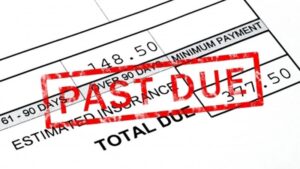If Your Business is in Debt, a Winding Up Petition Could Follow Sooner than You Think
Around one in five businesses in the UK are worried about the amount of debt they currently owe creditors.
Whilst most debts accrued by small businesses are owed to HMRC, owners are in fact more concerned about trade debts.
Businesses deal with these types of debts on a daily basis, and so they can seem more palpable than money owed to the Crown.
HMRC is more likely to take a company through a process and give them up to six weeks notice before issuing a winding up petition.
On the other hand, trade creditors can stop supplying businesses straight away, which can cause detrimental operational problems.
Trade creditors also tend to be more robust than HMRC and can give businesses just 21 days to pay the debt via a statutory demand.
A statutory demand is less costly than a winding up petition so creditors tend to go for that first.
Some business owners believe a creditor is obliged to issue a statutory demand before a serving winding up petition, but that is not the case.
There are three main grounds in Section 123 of the Insolvency Act 1986 which state the definition of being unable to pay a debt:
1. If the debtor is in breach of a county court judgement
2. If 21 days have lapped following a statutory demand.
3. If it is proved to the satisfaction of the court that the company is unable to pay their debts as and when they fall due.
A winding up petition can be filed if you are unable to pay a debt exceeding £750 in accordance with any of the clauses above.
At the end of the day, debt is debt. It’s the willingness of the creditor to enforce the action.
But with the forthcoming VAT rise and the impact of public sector cutbacks yet to be felt in full, it’s vital for businesses to be concerned with repaying money they owe before their financial woes spiral out of control.
For free, confidential advice on how you can do this, contact Insolvency and Law now on 0207 504 1300.
Debtor Alert: Theodore Global Ltd
Theodore Global Ltd: A Company That Fails to Pay Its Staff and Trades While Insolvent If you’re thinking about working with, or for Theodore Global…
Read MoreIrene MacKenzie- The Gatekeeper of Silence
Irene MacKenzie and the Web Around William Jackson In the shadows of the alternative investment world, where buzzwords are abundant but redemptions are not, one…
Read MoreThe Grim Truth for Loan Note Holders -79th Luxury Living Six Ltd (LL6)
No assets or safeguards. No clear path to recovery. If you’re one of the many investors who entrusted your money to The 79th Group’s loan…
Read MoreOverdrawn Directors’ Loan Accounts: How to Avoid Trouble
Many company directors borrow money from their businesses through what’s known as a director’s loan account (DLA). In principle, there’s nothing wrong with this, so…
Read More




